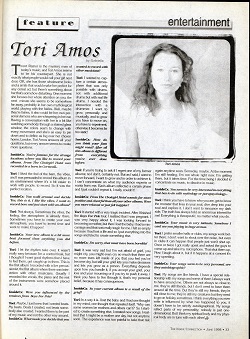|

songs | interviews | photos | tours | boots | press releases | timeline
The Inside Connection (US)
June 1998 - Volume 1, Issue 7

Tori Amos
Up Close and Personal
By Gabriella
Trent Reznor is the mystery man of today's music, and Tori Amos seems to be
his counterpart. She is not exactly what people would call your girl next door.
OK, she has those wholesome looks and a smile that would make her perfect for
any cereal ad, but there's something about her that's somehow disturbing. One
moment she focuses her whole attention on you, the next minute she seems to be
somewhere far away, probably in her own mythological world, playing with the
fairies. Well, maybe they're fairies, it also could be her own personal demons
who are whispering in her ear. Having a conversation with her is a bit like
watching somebody though a stained glass window; the colors seem to change with
every movement and she's as easy to pin down and to define as fog over her
chosen home, London. Tori Amos answers all your questions, but every answer
seems to create more questions.
InsideCX:
You're famous for the strange locations where
you like to record your albums. From the Choirgirl Hotel was recorded in a barn
in Cornwall...
Tori:
I liked the feel of the barn, the vibes, and I was persuaded to
record this album in an environment where it's a bit easier to work with
people, to record. So it was the perfect location.
InsideCX:
You walk around and decide 'Yes, this is it,
I like the vibes, I want to record here and just start with an album?'
Tori:
Not always. Sometimes the vibes, the feeling, the atmosphere is
already there. Sometimes you have to create your own atmosphere, you have to
invest time and work to make it happen.
InsideCX:
Your new album is a bit more beat focused
than anything you did before.
Tori:
I let the rhythm take over, it wasn't really easy because I'm a
control freak, but I thought if I want good rhythms then I have to feel them,
get caught up in them. This is the first album I recorded with a live
percussionist, the first album where there was interaction with other musicians.
Usually I recorded the vocals, the piano and the rest of the instruments were
somehow placed around it.
InsideCX:
Were you influenced by the remixes from Boys
for Pele?
Tori:
Maybe, I just knew that I wanted beats. My beats. Beats I created,
not beats somebody else created. I wanted them to be part of my music and not
the other way around.
InsideCX:
What made you decide that you wanted to
record with other musicians?
Tori:
I wanted to capture a certain atmosphere that was only possible
with drums, not with additional drums but with real life drums. I needed the
interaction with a drummer. I want to grow, personally and musically, and to
grow you have to move on, you have to experiment, otherwise it becomes far too
static.
InsideCX:
How do you think your fans might react? After
all, this album is different from everything you've ever done before.
Tori:
If you're trying to ask if I regret one of my former albums; no I
don't, certainly not. But as I said, I want to move forward, I want to grow and
in order to achieve it, I can't concentrate on what my audience expects or
wants from me. Each album reflected a certain phase and I just couldn't repeat
it, I really couldn't.
InsideCX:
From the Choirgirl Hotel sounds far more
positive and cheerful than all your other albums. Were you more relaxed or just
felt happier?
Tori:
It started with a very tragic incident. After I finished the Boys
for Pele tour, I realized that I was pregnant. I was very happy about it, I was
looking forward to becoming a mother, but then I lost the baby. I had a
miscarriage and that was really tragic for me. I felt so empty because I had
lost a life and so I put everything into the songs and tried to create
something else.
InsideCX:
I'm sorry, that must have been horrible!
Tori:
It was very sad but I'm not afraid of grief. You might cry, you
might even cry so much that there are no more tears left inside of you that you
feel you've become dry, but still your grief lets you make decisions and lets
you grow as a person. Everything depends upon how you handle it, if you accept
your grief, your loss and your mourning or if you try to push it away. I think
you have to live through it, that's my personal belief, because it has
consequences.
InsideCX:
So your current album is a result of the
grief?
Tori:
In a way it is. I lost the baby and I had one thought in my mind,
one thought that repeated itself. 'Why can some women be mothers and others can't?'
So I started to create something else, I created new songs. I realized that I
might be a mother one day, but not anytime soon. The experience was too painful
to take that risk again anytime soon. Someday, maybe. At the moment I'm still
healing, I'm not whole right now. I'm getting there, but it takes time. For the
time being I decided to concentrate on music, to dissolve in music.
InsideCX:
You seem to be very interested in everything
that has to do with mythology or parapsychology...
Tori:
I think you have to know who you are, get to know the monster that
lives in your soul, dive deep into your soul and explore it. I don't want to
renounce my dark side. The truth has always held an enormous interest for me.
Everything is therapeutic, no matter what you do.
InsideCX:
Your music is very intimate. Somehow I can't
see you playing in huge arenas.
Tori:
I prefer smaller halls or clubs, my songs work better there. I don't
want to shout over the noise, but even in clubs it can happen that people just
won't shut up. Once or twice I got really upset and asked the guys to come up
and take my microphone. That shut them up. Now I laugh about it, but if it
happens at a concert it's very upsetting.
InsideCX:
Your songs seem to be very personal, are they
autobiographic?
Tori:
My songs are like friends. I have a special relationship with my
songs and some of them I always want to have around me. Others are not always
so close to me, they're still friends, but I don't need to have them around all
the time. But they're still my friends, they're still close to me; they're
still my creatures but they need to go on holiday sometimes. I think everything
you ever write is influenced by what has happened to you, it doesn't have to be
strictly autobiographical. My songs reflect parts of my personality; nobody is
just one-dimensional. But I think my spiritual body and my physical body are in
tune with each other
original article

[scan by Sakre Heinze]
t o r i p h o r i a
tori amos digital archive
yessaid.com
|